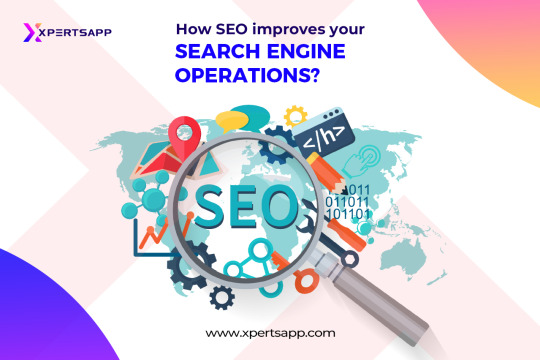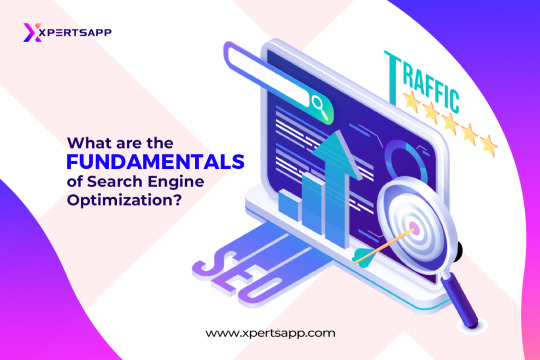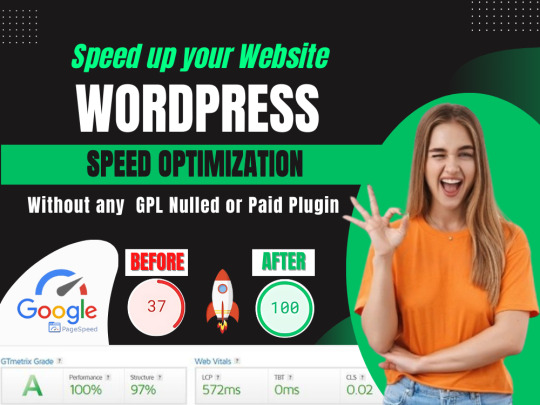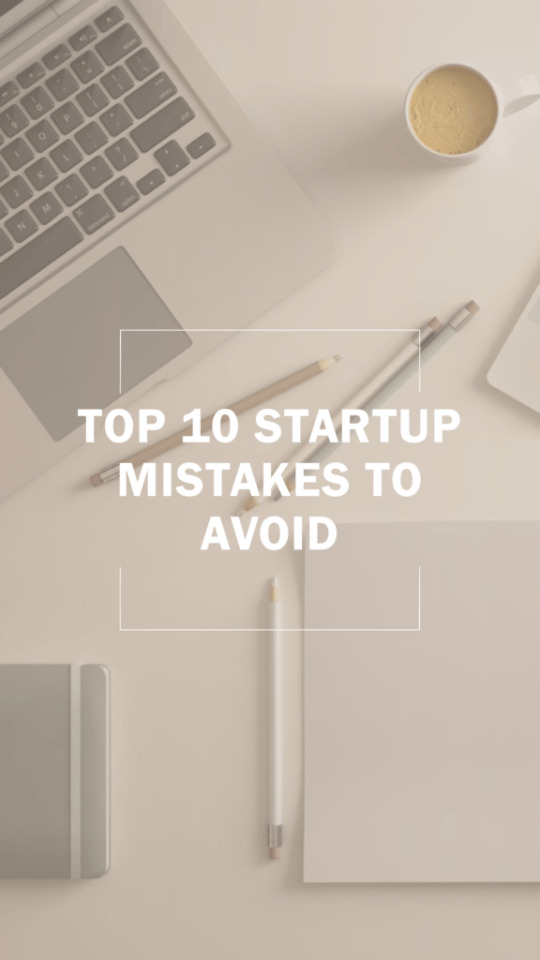#how to optimize wordpress website for speed
Text
0 notes
Text
The Importance of Website Speed for User Experience
When you go online, think about how fast you want sites to load. Most of us can’t stand waiting more than a couple of seconds. We’ve all gotten used to quick internet access, making our patience thin when things slow down.
Now, picture this: if your website takes over three seconds to show up, people leave in a hurry. They expect speed; not meeting that need means they might not come back. In the…

View On WordPress
#how to improve website speed#how to increase website speed#how to make website load faster#how to speed up my website loading#how to speed up wordpress website#how to speed up your website#increase website speed#optimize website speed#speed up website#speed up wordpress website#user experience#website speed#Website Speed for User Experience#website speed increase#website speed optimization#website speed test
0 notes
Video
youtube
Best settings for WP-Rocket plugin to achieve High GT Metrix score and website speed - eComHardyGet a discount when you purchase the WP-Rocket plugin from the below link. https://ecomhardy.com/wprocket You will receive an extra discount as follow; 10% OFF on Single license 15% OFF on Plus license 20% OFF on Infinite license In this video, I have explained the best settings in the WP-Rocket plugin for your WordPress Woocommerce website which will help you not only to achieve the best GT Metrix score but also boost the website speed. ------------------------------------------------------------------------------------------------ Part 1- How to make a website - Buy right Domain and Hosting https://youtu.be/y-JoRxhwhE8 Go to, https://ecomhardy.com/make-a-website All the steps with useful information are provided there. Part 2- Make a website- How to install WordPress on your website; https://youtu.be/t0E7_rp8LrY Bonus video: To know How to point the domain name servers to your hosting, check out the link; https://youtu.be/6UNA7AY-lxw Part 3 - How to install a theme on WordPress. https://youtu.be/inO0H4LPpNQ Thanks for watching. Consider subscribing.
#wordpress#woocommerce#elementor#dropshipping#ecommerce#ecomhardy#wp-rocket#best settings for wp rocket#how to increase the website speed#how to increase the speed of wordpress website#use wp rocket to speed up your slow page builder sites#wordpress speed optimization - how i got 100% gtmetrix scores#how to speed up your wordpress website#cache plugins#caching#cdn#cloudflare#core web vitals#wp rocket
0 notes
Link
Optimizing a WordPress site for mobile is important because more and more people are using their mobile devices to access the internet, and a website that is not optimized for mobile may be difficult to use and may not function properly on a small screen. By optimizing your WordPress site for mobile, you can improve the user experience for mobile users and potentially increase traffic and revenue.
#wordpress mobile optimization#optimize wordpress site for mobile#improve mobile speed wordpress#optimize wordpress speed for mobile#wordpress optimization for mobile devices#how to optimize wordpress for mobile#optimize website for mobile
0 notes
Text
Checklist for Optimizing a #WordPress Website for #SEO.

1. Choose Reliable WordPress Hosting Provider:
Select a hosting provider known for good performance, uptime, and support, as this directly affects your site's speed and reliability.
2. Install an SEO-Friendly Theme:
Use a WordPress theme that is optimized for #SEO, lightweight, and mobile-friendly to improve your website’s performance and search rankings.
3. Do #Keyword Research for Your WordPress Website:
Identify relevant keywords that your target audience is searching for to optimize your content and attract more traffic.
4. Optimize Your #WordPress Website’s URL Structure:
Ensure that your URLs are clean, descriptive, and contain relevant keywords, which makes them more SEO-friendly.
5. Use Google #Analytics and Google Search Console:
Set up these tools to monitor your website’s traffic, performance, and search engine indexing, and gain insights for further optimization.
6. Optimize Site Crawling with #MetaTags:
Use meta tags like meta descriptions, title tags, and robots.txt to guide search engines in how to crawl and index your site effectively.
7. Check and Fix any #BrokenLinks:
Regularly audit your website to find and repair broken links, which can harm user experience and SEO.
8. Keep Creating Amazing #Content:
Consistently produce high-quality, valuable content that engages your audience and ranks well in search engines.
9. Optimize for Handheld Devices:
Ensure your website is responsive and offers a seamless user experience on mobile devices, which is crucial for both user experience and #SEO.
10. Tweak Loading Speed for Better UX:
Improve your site’s loading speed through techniques like image optimization, caching, and minimizing code, as faster sites rank better and provide a better user experience.
11. Get an SSL Certificate for Your #WordPress Site:
Secure your website with an SSL certificate, which encrypts data and is also a ranking factor in Google’s algorithm.
12. Install an #SEO Plugin Like Yoast SEO or Rank Math:
Use these plugins to help optimize your site’s SEO by providing guidance on best practices and offering features like meta tag management and XML sitemaps.
13. Generate and Submit Your #Sitemap to Google Search Console:
Create an #XMLsitemap and submit it to #Google Search Console to help search engines crawl and index your site more efficiently.
14. Build High-Quality #Backlinks for Your #WordPress Website:
Acquire backlinks from authoritative sites to improve your site’s credibility and search engine rankings.
15. Update the WordPress #Ping List to Ensure Quick Indexing:
Modify the ping list in WordPress to notify more services when you publish new content, helping it get indexed faster by search engines.
#seo#seoconsultant#seoexpert#seoadvice#seoagency#seocompany#digitalmarketing#googleads#keywords#seo marketing#seotips#seoservices#digital marketing service#search engine optimization#seostrategies#SEO2024#Hireseoexpert#looking for seo
2 notes
·
View notes
Text
Digital marketing online course in Mohali and Chandigarh | Param digital marketing
Digital Marketing Course – Learn Online and Save Money
Below is an outline of an online digital marketing course content. This content is a general guideline and can be adapted and expanded based on the specific needs of the course and the level of expertise of the learners. Learn Advanced Digital Marketing with DKI and DSA Ads only in 29999/– now – Join Now
Digital marketing online course in Mohali and Chandigarh.

Understanding digital marketing and its importance
Evolution of digital marketing
Digital marketing vs. traditional marketing
Key concepts and terminology
Book Class Now
Module 2: Website Planning and Development
Importance of a website in digital marketing
Domain registration and hosting
Website design principles and best practices
User experience (UX) and user interface (UI)
Mobile responsiveness and optimization
Introduction to Content Management Systems (CMS) like WordPress
Module 3: Search Engine Optimization (SEO)
Want to join click here
Understanding search engines and how they work
On-page SEO: Keyword research, Density and Proximity, meta tags and Description, headings, content and image optimization
Off-page SEO: Link building, backlinks, and domain authority, DA/PA Checking
Technical SEO: Website speed, site structure, and crawlability, Mobile Friendly, Security
Local SEO and Google My Business Page Optimization
Module 4: Content Marketing
Importance of quality content writing in the digital landscape
Creating a content writing strategy
Types of content: blog posts, articles, infographics, videos, etc.
Content promotion and distribution
Content analytics and measuring success
Module 5: Social Media Marketing
Overview of major social media platforms (Facebook, Twitter, LinkedIn, Instagram, Pinterest, Tumblr etc.)
Creating a social media strategy
Social media advertising and sponsored posts, Event Creating
Building and engaging with an online community
Social media analytics and performance tracking
Module 6: Email Marketing
Building an email marketing list
Creating effective email campaigns
Email marketing tools and platforms
Personalization and segmentation
Analyzing email marketing performance
Module 7: Pay-Per-Click (PPC) Advertising
Introduction to PPC Advertising and Google Ads
Creating PPC campaigns and ad groups
Keyword research and selection
Ad copywriting and A/B testing
Bid strategies and budget management
Module 8: Display and Banner Advertising
Understanding display advertising and its formats
Display advertising platforms (Google Display Network, etc.)
Targeting options for display ads
Designing effective banner ads
Display ad performance tracking and optimization
Module 9: Video Marketing
The rise of video content in digital marketing
Creating engaging video content
Video SEO and optimizing for platforms like YouTube
Video advertising and sponsored content
Analyzing video marketing metrics
Module 10: Analytics and Data-driven Marketing
Introduction to marketing analytics
Setting up Google Analytics and understanding key metrics
Data analysis for decision-making
A/B testing and conversion rate optimization (CRO)
Customer journey and attribution modeling
Module 11: Mobile Marketing
Mobile marketing trends and opportunities
Mobile app marketing and optimization
SMS marketing and push notifications
Mobile advertising and location-based marketing
Mobile analytics and tracking
Module 12: Digital Marketing Strategy and Planning
Developing a comprehensive digital marketing strategy
Integrating various digital marketing channels
Budget allocation and resource planning
Measuring ROI and KPIs for digital campaigns
Case studies and real-world examples
Module 13: Legal and Ethical Considerations
Privacy and data protection laws (e.g., GDPR)
Ethical practices in digital marketing
Dealing with online reviews and reputation management
Handling customer data responsibly
Module 14: Emerging Trends in Digital Marketing
Artificial Intelligence (AI) and machine learning in marketing
Voice search and voice-activated devices
Augmented Reality (AR) and Virtual Reality (VR) marketing
Influencer marketing and social media trends
Future outlook and staying ahead in the digital marketing landscape
Module 15: Final Project and Certification
Capstone project applying concepts learned throughout the course
Presentations and feedback sessions
Issuance of course completion certificates
Remember that this is just a general outline, and the content and depth of each module can be adjusted to suit the course’s duration, audience level, and objectives. Additionally, including practical exercises, case studies, and hands-on projects will enhance the learning experience. We provide 100% Job Placement after completion of Course.
Digital marketing online course in Mohali and Chandigarh.
#digital marketing#online marketing#seo services#search engine optimization#mohali#chandigarh#tricity#learning#education#student#university#jobseekers#college#online courses
3 notes
·
View notes
Text
What is Search Engine Optimization (SEO) And How Exactly Does it Work?

Search Engine Optimization (SEO) is one of the best marketing strategies to provide long-lasting results in terms of traffic to your site. Having that in mind, you may ask, “How does search engine optimization work?” If you ask an expert SEO consultant: It is easier to know how it works once you know about the actual tactics of SEO to develop a certain amount of traffic for your website. Furthermore, you will understand what SEO (search engine optimization) is and how it works for your digital presence to gain more traffic.
Click Here to get the best SEO Services.
What is Search Engine Optimization (SEO)?
You’ve heard that SEO service can boost your website’s ranking on Search engines and increase traffic, but you need more clarity on how it operates or what areas to concentrate on. Discover what every digital marketer needs to know about SEO by reading on. “Search Engine Optimization” often known as SEO, is the practice of obtaining visitors via unpaid, editorial, or natural search results in search engines. It seeks to raise the position of your website in search results pages. Remember that the more individuals view a website, the higher it appears on the list.
Numerous diverse tasks go into effective SEO, including:
Finding appropriate terms with high potential for search traffic
Creating valuable content of the finest quality and optimizing it for both consumers and search engines
Including relevant links from reputable, high-ranking websites
Evaluating the outcomes
(SEO) Search Engine Optimization marketing is one of the most beneficial tools to gain organic traffic for your website.

What are the Fundamentals of Search Engine Optimization?
Knowing how to get your brand, website, or company noticed by searchers is an essential skill for anybody working in digital marketing. The best SEO service providers conduct business online, and keeping up with the best SEO solutions and trends can assist your website stay on top of your game. Although SEO constantly changes in small ways, its core principles remain constant. The best SEO service providers may divide SEO service into three main pillars or components that you must be aware of and practice regularly:
Technical Optimization:
It is the process of finishing tasks on your website that aren’t directly related to content but are intended to boost SEO. Behind the scenes, activities are frequent including Website functions like loading speed, theme, and many more.
On-Page Optimization:
On-page optimization is the procedure you employ to ensure the information on your site is appropriate and offers a beautiful user experience. A content management system can help you accomplish this by choosing the proper keywords to target inside your content. Additionally, many other components are involved in On-page Optimization, including image optimization, meta tags, and descriptions for every webpage of your website. It can quickly be done with the help of effective content management systems. Content management systems like WordPress, Wix, Drupal, Joomla, Magento, Shopify, and Expression Engine are typical examples.
Off-Page Optimization:
Off-page optimization is raising your site’s ranks in search engines by engaging in activities off-site of your website. Backlinks, which help to establish the site’s reputation, are a significant factor in this. However, many forms of backlinks come to use while the best SEO company in USA and most regions implement off-page strategies for SEO link building, like profile listing, business listing, forum commenting, blog commenting, and guest posting.
How SEO Improves Your Search Engine Operations?
They use search engines when someone has a question and wants to look up the answer online. Search engine algorithms are computer programs that indicate through data to provide users with the precise results they want. Search engines use algorithms to identify websites and choose which ones to rank for a particular keyword. Search engines go through three stages to find information: crawling, indexing, and ranking. However, Crawling is the discovery stage, indexing is the filing stage, and ranking is the retrieval stage.
Crawling:
The Crawling is the initial action. Search engines send out web crawlers to discover new pages and collect data. These web crawlers are sometimes known as robots or spiders. They aim to find new websites that are available and to frequently check previously viewed pages to determine if the material has changed or been updated. Search engines use links they’ve already found to crawl web pages. When a search engine searches your homepage, it will look for another link to follow and may follow the link to your new blog post if you have a blog post connected.
Indexing:
The indexing process comes next. A search engine determines whether or not to use the content it has crawled during the indexing process. A search engine will include a crawled web page in its index if it is worthy. At the end of the ranking process, this index is employed. A web page or other piece of material that has been indexed is filed and saved in a database so that it can be retrieved later. Most websites that offer specific and valuable information are indexed. A website could be excluded from the index if:
Its content is regarded as duplicates.
Its content is regarded as being of low quality or spam.
No one could crawl over it.
There were no inbound links to the page or domain.
Ranking:
SEO consulting services recommend that the ranking comes as the third and ultimately most crucial phase. Only once crawling and indexing are finished can order take place. Your website can be ranked once a search engine has crawled and indexed it. Search engines use more than a hundred ranking factors to categorize and rank content, and they all fall under one of the three SEO pillars: technical, on-page, or off-page Optimization. For the best SEO company, Search engines employ a variety of signals to determine how to rank websites, as follows:
Presence of keywords in the title tag:
Whether or not there is a use of the term or a synonym on the page and in the title tag
Web page loading time:
Whether the website is mobile-friendly and loads quickly
Website Reputation
Refers to how well-regarded the web page and website are for the subject we search for.
Conclusion:
SEO is optimizing web pages for search engines such as Google or another search engine. The best strategy to rank your pages at XPERTSAPP as the best SEO service provider is through holistic SEO, which focuses on optimizing every component of your website. Avoid using black-hat SEO techniques because doing so will eventually hurt your rankings. Instead, focus on sustainable SEO while keeping your user in mind; you will gain over time. Our Team of experienced SEO services and experts has distinct strategies to boost your rankings on search engines organically.
#seo services#search engine optimization#digital marketing#search engine marketing#seo#website optimization#on page seo
4 notes
·
View notes
Text
How to Perform a Technical SEO Audit
Technical SEO audit is crucial for website SERPs Ranking. It includes crawl accessibility, site speed & performance, mobile friendliness, and more
Learn More👇
#seo #technicalseo #sem #digitalmarketing #performancemarketing #seoaudit
In the ever-evolving landscape of search engine optimization (SEO), technical aspects play a crucial role in determining a website’s visibility and performance in search engine results. A technical SEO audit is a comprehensive evaluation of a website’s technical infrastructure to identify issues that may impact its search engine rankings. In this guide, we will walk you through the process of…

View On WordPress
#Advanced SEO#Digital Marketing#Search Engine Optimization (SEO)#SEM#SEO#SEO Tips#Technical SEO tips
3 notes
·
View notes
Text
The Essential Toolkit for Mastering SEO: A Guide to the Best SEO Tools
In the ever-evolving world of digital marketing, Search Engine Optimization (SEO) stands as a cornerstone technique, essential for any business aiming to increase its online visibility. The right SEO strategy can drive traffic, boost rankings, and enhance the overall user experience. Central to implementing this strategy effectively are SEO tools, which come in various forms, each offering unique functionalities to cater to different aspects of SEO.
The Importance of SEO
SEO is no longer just an option for digital marketing; it's a necessity. It's about understanding what people are searching for online, the answers they seek, the words they use, and the type of content they wish to consume. Knowing the answers to these questions will allow you to connect to the people who are searching online for the solutions you offer.
Types of SEO Tools
Keyword Analysis Tools: These are foundational for any SEO strategy. They help identify the keywords and phrases most relevant to your business and most likely to attract the right kind of traffic.
Content Optimization Tools: These tools assist in making your content more effective by analyzing keyword density, suggesting relevant synonyms, and ensuring that content is optimized for search engines.
Technical SEO Tools: They delve into the more technical aspects of your website, such as site speed, mobile-friendliness, and site structure, which are crucial for improving search rankings.
Link Building Tools: These tools aid in identifying link-building opportunities and managing backlinks, which are vital for enhancing site authority and search rankings.
Local SEO Tools: Particularly important for local businesses, these tools help optimize your website for local search results, making it easier for nearby customers to find you.
SEO Analytics and Reporting Tools: These provide insights into your SEO campaigns' effectiveness, track search rankings, and understand user behavior on your site.
How SEO Tools Help Businesses
Improved Search Rankings: By identifying the right keywords and optimizing website content, SEO tools can significantly improve your search engine rankings.
Enhanced User Experience: Technical SEO tools help in optimizing website speed and mobile-friendliness, leading to a better user experience.
Data-Driven Decisions: Analytics tools offer detailed insights into user behavior, enabling businesses to make informed decisions.
Time and Cost Efficiency: Automated tools save time and resources, allowing businesses to focus on other critical aspects of their operations.
Examples of Free SEO Tools
Google Analytics: A comprehensive tool for monitoring website traffic and user behavior.
SEMrush: Offers a suite of tools for keyword research, site audits, and competitor analysis.
Ahrefs: Known for its advanced link analysis and keyword research capabilities.
Moz Pro: Offers tools for site audits, keyword research, and link building.
Yoast SEO: A popular WordPress plugin that helps optimize website content.
Conclusion
Embracing the right SEO tools is not just about improving your website’s search engine ranking; it’s about connecting with your target audience, understanding their needs, and delivering a solution that resonates. In a world where online visibility is synonymous with success, SEO tools are not just tools; they are vital cogs in the machinery of digital marketing.
#googleads#marketingstrategy#digitalmarketingtrends#digitaladvertising#digitalmarketer#marketingstrategies#internetmarketing#seo#marketingconsultant#socialmediastrategy
4 notes
·
View notes
Text
Increase Organic Web Traffic — The Role of an SEO Specialist in Italy
Competitive landscape of digital marketing, the need for an SEO specialist has become more pronounced than ever. As businesses effort to increase their online visibility and effectively reach their target audience, the role of an SEO specialist in Italy has gained significant importance. In this article, we will explore key aspects related to SEO specialists, their costs, global recognition, demand, and the best SEO expert in Italy — Mollik Sazzadur Rahman.

Increase Your Brand Name — Boost Up Your Local Business
Doing Local SEO for local business alone will not get the right results. At present you need to increase your Brand Value. SEO is not everything to get traffic. Yes it is true SEO is good for getting organic traffic.
It’s better that you grow your brand name (by social media marketing or physically marketing) and I handle your SEO part.
How much does an SEO specialist cost?
Investing in the services of an SEO specialist is a strategic move for businesses aiming to thrive in the online sphere. The cost of hiring an SEO specialist can vary based on several factors, including the scope of work, the complexity of the project, and the level of expertise required. On average, businesses in Italy can expect to pay anywhere from €500 to €3000 per month for professional SEO services. It’s crucial to view this as an investment rather than an expense, considering the long-term benefits and increased visibility an SEO specialist can bring to your business.
Who is The World’s No. 1 SEO Expert?
Identifying the world’s No. 1 SEO expert is a subjective matter, as the field is vast and constantly evolving. However, there are several renowned figures who have made significant contributions to the SEO industry. Recognized names include Rand Fishkin, Neil Patel, and Brian Dean. These experts have demonstrated their prowess through innovative strategies and a deep understanding of search engine algorithms. While ranking the world’s №1 SEO expert may be challenging, it’s essential to acknowledge and learn from the thought leaders shaping the industry.
And among them, the name of Mollik Sazzadur Rahman has to be mentioned as an SEO expert. Even if he is not the world number one, but he can improve any local business by SEO services.
Mollik’s SEO Skills As an Optimizer for Website
As Website SEO expert Mollik can do everything. But social media marketing is not his job. So,
Profitable Keyword Research
Content Analysis
On Page SEO
Used LSI Keywords into H2-H6 Tag
Image Optimization
Yoast SEO, Rank Math specialist
URL, SEO Title & Meta Description Utilize
Schema and Canonical Tag Generate
Technical SEO
Sitemap, Robots.txt Setup
Redirection, and 404 error solved
Page Speed Optimization
Off-Page SEO
Guest Post, Web 2.0
Social Bookmarking
WordPress, Shopify and Wix Management
Google Analytics specialist
Google Search Console Analysis
SEO Audit Services
Competitors Analysis & Information Spy
Weekly & Monthly Report
Are SEO experts in demand?
The demand for SEO specialists continues to surge as businesses recognize the pivotal role search engine optimization plays in their online success. In Italy, as elsewhere, companies are seeking skilled professionals to optimize their websites, improve search engine rankings, and drive organic traffic. With the digital landscape becoming increasingly competitive, businesses are realizing the need for specialized expertise to navigate the complexities of SEO. This growing demand presents a promising opportunity for individuals looking to pursue a career as an SEO specialist in Italy.
In conclusion, the role of an SEO specialist in Italy is pivotal in the digital age, and the demand for skilled professionals in this field is on the rise. Businesses seeking to stay competitive and enhance their online visibility can benefit significantly from the expertise of an SEO specialist. Mollik Sazzadur Rahman, with his experienced skilled record and commitment to excellence, stands as a leading SEO expert in Italy, ready to guide businesses towards online success.
2 notes
·
View notes
Text
WordPress Speed Optimization without GPL Nulled Or Paid Plugin

Are you using GPL or Nulled plugins for website optimization? GPL or Nulled plugins are very Harmful to websites. There is a lot of possibility of hacking the site. I will do WordPress website optimization for you without GPL, Nulled, or any Paid Plugin.
My name is Saiful Ahmed, and I specialize in WordPress website speed optimization. I trust this message finds you well. I've been following your agency's exceptional work in the WordPress sphere, and I'm reaching out to explore the possibility of a partnership that could bring added value to your clients.
Here's how we can collaborate:
✅ Comprehensive Speed Analysis
✅ Customized Optimization Plan
✅ Image Optimization
✅ Database Optimization
✅ Caching Configuration
✅ Server Optimization
✅ Content Delivery Network (CDN) Integration
✅ Performance Testing and Monitoring
✅ Guaranteed Results
Thank you for considering this proposal. I look forward to the possibility of working together to elevate your agency's offerings and deliver exceptional results for your clients.
#wordpress speed optimization#website speed optimization#page speed optimization#increase website speed
2 notes
·
View notes
Text
Web Host Performance and Website Speed
Your website’s speed can make or break the experience for your visitors. Fast loading times, easy site flow, quick server replies, and well-set content delivery are key. These parts ensure users enjoy their visit from start to finish across all gadgets.
A slow site often means people leave fast which isn’t good for how they see your brand. Everyone likes a snappy website; it helps them get what…

View On WordPress
#how to increase website speed#how to make website load faster#how to speed up my website loading#how to speed up wordpress website#how to speed up your website#how to speed up your wordpress website#improve website speed#increase website speed#speed up website#speed up wordpress#speed up wordpress website#speed up your wordpress website#website speed#website speed optimization#website speed test#wordpress speed optimization#wordpress website speed
0 notes
Text

SEO Best Practices for a Smooth Transition from WordPress to HubSpot
In the world of website management, transitioning from WordPress to HubSpot is a strategic move. This article delves into the best practices for a seamless transition while safeguarding your SEO rankings.
Introduction
Understanding the Importance of a Smooth Transition
Moving your website to HubSpot offers various advantages, such as improved marketing automation and lead nurturing capabilities. However, ensuring a seamless transition is crucial to preserve your site's search engine rankings, organic traffic, and user experience.
The Role of SEO in the Migration Process
For your move to be successful, SEO is essential. It entails a sequence of calculated actions, such as evaluating your present WordPress website, setting up your HubSpot environment, and putting SEO best practices into action.
Assessing Your Current WordPress Site
Conducting a Thorough Website Audit
Begin by conducting a comprehensive audit of your WordPress website. Identify key SEO strengths and weaknesses that need to be addressed during the migration.
Identifying SEO Strengths and Weaknesses
Determine which aspects of your current SEO strategy are working well and what areas require improvement. This information will guide your SEO strategy in HubSpot.
Preparing Your HubSpot Environment
Setting up Your HubSpot Account
Create and set up your HubSpot account first. Make sure the features and plan you select meet your marketing and SEO objectives.
Configuring SEO Settings in HubSpot
Setting Up SEO Tools and Preferences in HubSpot HubSpot provides a number of SEO tools and options. Learn how to use these choices and set them up to maximize your SEO efforts.
Content Migration Strategy
Creating a Content Migration Plan
Develop a comprehensive plan for migrating your content from WordPress to HubSpot. This plan should include content mapping and categorization.
Best Practices for Content Transfer
Ensure that your content migration process maintains the integrity of your existing content and metadata. This will help preserve your SEO rankings.
Mobile Optimization and Page Speed
Ensuring Mobile-Friendliness
Make sure your HubSpot website is mobile-friendly to comply with Google's mobile-first indexing mandate.
Optimizing Page Speed for SEO Benefits
In addition to enhancing user experience, a quicker website helps you rank higher in search results. Put speed optimization strategies into practice.
301 Redirects and Link Management
Implementing 301 Redirects Effectively
Make sure search engines and users are redirected to the appropriate pages on your newly launched website by correctly implementing 301 redirects.
Managing Internal and External Links
To make sure the links are relevant and operational in your new HubSpot environment, review and update both internal and external links.
SEO-Friendly URL Structure
Crafting SEO-Friendly URLs in HubSpot
In HubSpot, create clear and informative URLs. Adapt any modifications to the URL structure and configure appropriate redirects.
Handling URL Redirects and Structure Changes
When altering URL architecture, use redirects to prevent broken links and preserve SEO authority.
Image and Multimedia SEO
Image Optimization in HubSpot
Optimize images for SEO by compressing them, using descriptive alt tags, and reducing file sizes.
SEO for Multimedia Content
Ensure multimedia content is appropriately labeled and optimized for search engines.
Ensuring a Smooth User Experience
User-Friendly Navigation and Design
Design your HubSpot website with user-friendly navigation and layout to enhance the overall user experience.
Content Organization and Site Structure
Organize your content logically to help users find information easily. A well-structured site benefits SEO.
Conclusion
In conclusion, transitioning from WordPress to HubSpot can bring significant benefits to your digital marketing efforts. By following these SEO best practices, you can ensure a smooth migration process while preserving your website's search engine rankings and user experience.
#website migration#wordpress to hubspot#wordpress to hubspot mnigration#web migration#SEO#web design#web development
2 notes
·
View notes
Text
How do I use WordPress for Ecommerce?
WordPress is a versatile platform that can be effectively used for e-commerce. Here's how to make the most of it:
Choose the Right E-commerce Plugin: WordPress offers several e-commerce plugins like WooCommerce, Easy Digital Downloads, and more. Choose one that suits your needs. For most, WooCommerce is a robust and user-friendly option.
Select a Hosting Provider: Opt for a reliable hosting provider that can handle your e-commerce website's traffic and security requirements. Managed WordPress hosting can be a good choice.
Install and Configure Your E-commerce Plugin: Once you've set up WordPress, install your chosen e-commerce plugin. Follow the plugin's documentation to configure it, add products, set prices, and define shipping options.
Select a Suitable Theme: Choose a WordPress theme optimized for e-commerce. Many themes are designed to work seamlessly with e-commerce plugins, ensuring a cohesive look and feel for your online store.
Customize Your Store: Customize your website to match your brand's identity. This includes adding your logo, selecting colours, and arranging elements to create an appealing and user-friendly design.
Add Products and Content: Populate your online store with products or services. Write detailed product descriptions, set prices, and include high-quality images. Ensure that your content is engaging and SEO-friendly.
Implement Payment Gateways: Integrate payment gateways that allow customers to make secure transactions. PayPal, Stripe, and Authorize .net anywhere are popular choices.
Set Up Shipping Options: Configure shipping options based on your business model. Offer choices like standard shipping, express delivery, or local pickup.
Focus on SEO: Optimize your website for search engines. Use relevant keywords, write meta descriptions, and create high-quality content to improve your site's visibility in search results.
Ensure Mobile Responsiveness: Many shoppers use mobile devices. Ensure your site is responsive and looks great on smartphones and tablets.
Implement Security Measures: Security is crucial for e-commerce. Install security plugins, use SSL certificates, and regularly update your plugins and WordPress core for protection against threats.
Test Your Site: Before launching, thoroughly test your website. Check for broken links, ensure the checkout process works flawlessly, and test the loading speed.
Launch and Market Your Store: Once you're confident everything works as expected, launch your e-commerce store. Promote it through social media, email marketing, content marketing, and other online channels.
WordPress can be a powerful platform for e-commerce when used correctly. Following these steps and staying committed to ongoing optimization can create a successful online store with WordPress.
2 notes
·
View notes
Text
How to Turn Your Online Business Dreams into Reality


Introduction: The Digital Frontier of Entrepreneurship
Selecting a Niche and Business Model: The Foundation of Success
Building Your Online Platform and Brand: Your Digital Headquarters
Creating High-Demand Products and Services: Delivering Value to Your Audience
Implementing Effective Marketing Strategies: Attracting Targeted Traffic
Diversifying Revenue Streams for Maximum Profits: Building Financial Stability
Optimizing for Maximum Profitability Long-Term: Building a Sustainable Business
Conclusion: Turning Dreams into Reality
True successful story
Introduction: The Digital Frontier of Entrepreneurship
In today's digital age, the rise of the internet and technology has revolutionized the way we do business. It has opened a world of opportunities for entrepreneurs to start and run their own businesses online. Online businesses offer flexibility, scalability, and the potential for global reach. This comprehensive guide will provide you with a step-by-step framework for building a profitable online business from the ground up. Whether you want to start a side business or build a full-time online empire, follow this ultimate guide to turn your idea into a thriving, sustainable online business. With focus, grit, and commitment to continuous improvement, you can build the profitable online business of your dreams.
Selecting a Niche and Business Model: The Foundation of Success
The foundation of every successful online business is choosing a profitable, in-demand niche and a business model tailored to your goals. Select a niche you're passionate about; this will make creating content a breeze. Conduct thorough keyword research to assess search volume and demand. Join relevant online communities to connect with your audience and understand their needs. Evaluate direct competitors in the niche and aim for less saturated niches or unique angles. Consider affiliate marketing potential, as some niches offer higher commissions. Assess opportunities to create multiple products and monetize in diverse ways. Examples of popular online business niches include health, fitness, personal finance, pet care, tech, travel, content marketing, home design, spirituality, language learning, and more.
Choose a business model that complements your niche and provides multiple income stream opportunities. Many successful online businesses incorporate 3-4 monetization models. Some of the best online business models to consider include:
1. Blogging: Make money with display ads, affiliates, and branded products.
2. Online Courses: Sell your knowledge and expertise as courses.
3. Dropshipping: Curate and sell products without inventory.
4. Affiliate Marketing: Earn commissions promoting other companies' products.
5. Information Products: Sell online books, templates, checklists, and more.
6. Virtual Services: Provide consulting, freelancing, coaching, or other services.
7. Subscription Membership Site: Offer exclusive content or tools for a monthly fee.
8. E-commerce Store: Sell physical products, merchandising, and more.
Your choice should complement your niche and offer multiple income streams. Many successful online businesses incorporate 3-4 monetization models.
Building Your Online Platform and Brand: Your Digital Headquarters
Your website or blog will serve as the headquarters for your online business. Invest time upfront in creating an optimized, professional-looking platform. Purchase a domain name that matches your brand, ideally a .com if available. Select reliable web hosting with optimal speed and uptime. Install WordPress or ecommerce platforms like Shopify or WooCommerce. Design an on-brand, mobile-responsive theme that conveys your style. Include essential pages like Home, About, Contact, Services, Blog, and Shop. Set up email marketing and analytics to capture leads and track traffic data. Create visually branded assets such as logos, color palettes, fonts, and graphics. Ensure a cohesive user experience across all touchpoints. If you lack web development skills, consider hiring a freelance designer to bring your vision to life. Continually optimize your website for higher traffic, leads, and sales over time. This includes technical enhancements, user experience improvements, and page speed optimizations.
Creating High-Demand Products and Services: Delivering Value to Your Audience
The key to running a profitable online business is consistently creating products and services that deliver extreme value to your audience. Popular digital products you can create include online courses, eBooks, guides, checklists, software, premium memberships, virtual events, video tutorials, templates, and more. When brainstorming products, look for opportunities to simplify lives, save time, educate, entertain, or improve outcomes for your target customers. Leverage your expertise and tap into the skills of others to create premium offerings.
High-value services like consulting, freelancing, coaching, and more can also be extremely lucrative. Promote your services through your website and social platforms. Structure your offerings to passively earn income over time, such as online courses that continually generate sales vs. 1-on-1 services that require ongoing effort. Deliver an excellent user experience across your products and relentlessly optimize based on feedback to foster raving fans who refer others.

Implementing Effective Marketing Strategies: Attracting Targeted Traffic
Once your online platform and offerings are ready, it's time to start attracting targeted traffic using proven marketing tactics. A diverse marketing mix is key. Some of the top strategies include:
1. Content Marketing: Create engaging blog posts, videos, and visual content.
2. SEO: Optimize your website for search engines through on-page optimization and link-building.
3. PPC Ads: Utilize platforms like Google, Facebook, Instagram, and YouTube for pay-per-click advertising.
4. Email Marketing: Build your email list with lead magnets, newsletters, and automation.
5. Social Media Marketing: Employ organic and paid tactics to engage your audience.
6. Affiliate Marketing: Recruit others to promote your products and earn commissions.
7. Influencer Partnerships: Collaborate with relevant influencers in your niche.
8. Live Events: Host local meetups or virtual events to connect with your audience.
9. Podcast Guest Appearances: Grow your authority and reach new audiences.
10. Retargeting Ads: Remarket to previous site visitors across the web.
Start by focusing on 1-3 core channels, then expand your efforts over time. Pay-per-click and social ads can help quickly scale an audience, while SEO and content creation tend to be most cost-effective in the long-term. Leverage tools like Google Analytics, Facebook Business Suite, and landing page builders to optimize results across all campaigns. Don't hesitate to enlist help from digital marketing agencies and specialists.
Diversifying Revenue Streams for Maximum Profits: Building Financial Stability
Generating multiple streams of revenue is key for building a highly profitable online business. Diversification reduces risk and provides stability as each income channel goes through ups and downs. Here are some of the most lucrative online business revenue models:
1. Product/Service Sales: Your core monetization stream. Ensure competitive yet profitable pricing.
2. Advertising: Display ads, sponsorships, native advertising, etc. Set up Google Ad Manager.
3. Affiliate Marketing: Promote other company's products for commissions. Join affiliate networks.
4. Memberships/Subscriptions: Offer exclusive benefits, content, or tools for a monthly fee.
5. Events: Sell tickets for online or in-person events and training programs.
6. Dropshipping: Curate and sell products without holding inventory.
7. Physical Merchandise: Sell branded products with print-on-demand services.
8. Consulting/Freelancing: Sell your skills and expertise through 1-on-1 services.
9. Tip Jars/Donations: Allow fans to tip or donate to show support.
Aim to generate income from both active efforts like service packages and passive streams like online courses that earn as you sleep. Automate processes wherever possible to scale income without increasing workload proportionally. Reinvest profits back into growing your business and diversifying income channels to create an unstoppable snowball effect over time.



Optimizing for Maximum Profitability Long-Term: Building a Sustainable Business
Launching a profitable online business is an important first step. However, creating systems and processes that enable high profitability long-term is vital for sustaining growth. Here are some best practices for optimizing operations and profitability:
- Obsessively track KPIs and metrics for all marketing channels and funnels. Analyze data to optimize underperforming areas.
- Create excellent customer support systems. Provide prompt, personalized support to increase satisfaction and referrals.
- Automate repetitive tasks wherever possible with tools like Zapier. Automate lead collection, customer onboarding, analytics, inventory management, etc.
- Systematize your product creation process to quickly test and validate new product ideas, then scale those that resonate.
- Document your systems and processes so future hires can replicate them. This includes SOPs for customer service, product fulfillment, etc.
- Build a skilled team over time by hiring virtual assistants, freelancers, agencies, and eventually full-time employees. Focus on higher-level strategy.
- Maintain work-life balance as a long-term entrepreneur. Make time for adequate rest, leisure, and self-care to avoid burnout.
By staying agile, embracing innovation, and relentlessly providing value to your audience, you can build an online business that delivers meaningful income for decades to come.



Conclusion: Turning Dreams into Reality
Starting and running a profitable online business takes consistent effort and persistence. However, by zeroing in on a niche, selecting the right model, crafting high-value offerings, implementing diverse marketing strategies, diversifying your revenue streams, and optimizing for maximum efficiency, you can build an online business that provides freedom and fulfillment for years to come. Remember to stay obsessively focused on understanding and serving your target audience. Combine your passion with grit, resilience, and creativity. With the right mindset and business foundations in place, you have immense potential to build a thriving online business that stands out and makes a lasting impact. The time to stop dreaming and start taking action is now. Follow this comprehensive guide to turn your online business idea into reality, step-by-step. You can build an online empire that allows you to live life on your terms. The possibilities are truly endless if you commit to continuous learning and improvement. Let this guide spark the fire within and set you on the path to online business success. Start pursuing your online entrepreneur dream today.


True successful story
To illustrate the principles and strategies discussed in this comprehensive guide, let's delve into the inspiring true story of Pat Flynn and his online business, Smart Passive Income.
Smart Passive Income - About Pat Flynn
Background:
Pat Flynn was once an aspiring architect who unexpectedly found himself laid off during the economic downturn in 2008. Faced with uncertainty, he turned to the online world to seek alternative income sources. His journey began with a blog, which he aptly named Smart Passive Income (SPI).
Selecting a Niche and Business Model:
Pat recognized that there was a significant demand for information about creating online businesses and generating passive income. He was passionate about sharing his experiences, both successes and failures, and helping others navigate the world of online entrepreneurship. Pat's chosen niche was personal finance, but his business model extended beyond blogging.
Building Your Online Platform and Brand:
Pat invested in creating a professional-looking platform for SPI. He purchased a domain name, set up reliable web hosting, and designed an appealing website. His commitment to providing value was evident through the content he produced on his blog, podcast, and YouTube channel. His brand, Smart Passive Income, became synonymous with transparency, authenticity, and actionable advice.
Creating High-Demand Products and Services:
One of Pat's significant successes came from his creation of online courses and informational products. He developed courses on topics like email marketing, affiliate marketing, and podcasting, leveraging his expertise and audience trust. These products delivered immense value to his audience and contributed significantly to his income.
Implementing Effective Marketing Strategies:
Pat's marketing strategy was built on content marketing, podcasting, and email marketing. He consistently produced high-quality blog posts and podcasts, which not only attracted a dedicated audience but also positioned him as an industry expert. His email list grew as he offered valuable lead magnets and nurtured his subscribers.
Diversifying Revenue Streams for Maximum Profits:
Pat's income streams diversified over time. In addition to course sales, he earned from affiliate marketing, book sales, and speaking engagements. He also ventured into software development, creating tools like the Smart Podcast Player. This diversification provided stability and mitigated risk.
Optimizing for Maximum Profitability Long-Term:
Pat was relentless in optimizing his operations. He regularly analyzed data and user feedback to improve his products and content. His team expanded as the business grew, allowing him to focus on strategic decision-making. Pat prioritized work-life balance, emphasizing family and well-being.
Conclusion:
Pat Flynn's journey from unexpected job loss to the creation of a successful online business, Smart Passive Income, serves as an inspiring real-life example of the principles discussed in this guide. His dedication to providing value, commitment to continuous improvement, and willingness to diversify income streams are key takeaways for anyone aspiring to build a thriving online business. Pat's story reminds us that with the right mindset and a clear vision, online entrepreneurship can lead to a fulfilling and prosperous career.


Read the full article
#business-model#guide#marketing#niche#online-business#products#profitability#revenue#services#Success
5 notes
·
View notes
Text
What tools do you use to improve website rankings?
Boosting your website rankings requires a multifaceted approach.
Here's a lineup of indispensable tools that can help you climb the search engine ladder.
1. Keyword Research Tools
The Foundation of SEO
Keyword research tools are your gateway to understanding what your target audience is searching for. They provide insights into relevant keywords, their search volume, and competition. SEO Audit Tools include SEMrush, Ahrefs, and Google Keyword Planner.
2. On-Page SEO Tools
Crafting SEO-Optimized Content
To optimize individual pages for search engines, on-page SEO tools are indispensable. They analyze your content for factors like keyword usage, meta tags, headers, and readability. Yoast SEO and Moz On-Page Grader are valuable choices.
3. Backlink Analysis Tools
Building Authority
Building a robust backlink profile is crucial for SEO success. Tools like Moz's Link Explorer and Ahrefs allow you to analyze your backlinks, identify toxic links, and explore opportunities for link building.
4. Technical SEO Tools
Technical SEO tools help uncover and rectify issues that might hinder your website's performance. They check for issues like site speed, mobile-friendliness, and XML sitemaps. Google's PageSpeed Insights and Screaming Frog SEO Spider are top picks.
5. Content Management Systems (CMS)
Choosing the right CMS, such as WordPress or Joomla, can simplify content management and SEO efforts. These platforms often offer plugins and extensions to enhance SEO capabilities.
Conclusion
In the quest to improve your website rankings, these tools are your trusted allies. From understanding your audience through keyword research to optimizing your content with on-page SEO tools and building authority with backlinks, the right tools can make the journey smoother and more effective.
Remember, achieving and maintaining high website rankings is an ongoing endeavor, so embrace these tools, adapt your strategies, and keep climbing the search engine ladder. Your digital success story awaits.
FAQs about Tools for Improving Website Rankings
Q1: Can I rely solely on tools to improve my website rankings?
While tools are invaluable, a successful SEO strategy should encompass content creation, user experience optimization, and link building in addition to tool usage.
Q2: Are there free alternatives to paid SEO tools?
Yes, many free SEO tools offer essential features, although paid tools often provide more comprehensive data and advanced functionalities.
Q3: How often should I perform keyword research?
Keyword research is an ongoing process. Aim to revisit your keyword strategy periodically, especially when targeting new topics or industries.
Q4: Is it necessary to hire an SEO expert or agency?
Depending on your resources and expertise, you can either manage SEO in-house or hire experts. An experienced SEO professional or agency can provide valuable insights and save you time.
3 notes
·
View notes